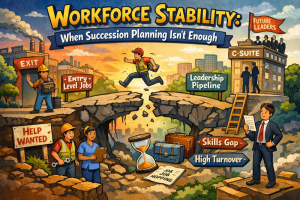Being a CEO is tough. Being a new CEO is even tougher. There are lessons to learn, often complicated by your own team members. I was having lunch with a recently appointed CEO of a small manufacturing company and I asked “How are sales?” The answer in a nutshell – “Not good.”
She explained that sales were flat and no matter what she did, she couldn’t get results from the team. One sales person was a time waster and spent a lot of time wanting to chat through everything. Another sales person didn’t communicate enough and often made decisions that effected delivery and made the operations team upset. The CEO had gone so far as to insert herself into many of the big opportunities, just to be sure things got done. To say she was “stressed out” would have been an understatement.
The problem was that she wasn’t understanding who her team was at their core. In order for her to get the most out of her team, she needs to know how they function, fully grasp what makes them tick. At the heart of each sales person – and all people in general, really – there are four personality types. These personality types give insight into who they are as individuals and help you understand what to look in order to get the most out of them.
The 4 Types of Sales Personalities
Like everything in life, people don’t fit into neat boxes. This is true when considering sales personalities as you will find people often cross lines, though they will likely have a dominant trait. Knowing how to spot these, will allow you to develop them on an individual level so they stay engaged in their work.
The Driver
Common Traits
Drivers are assertive and competitive people. They set goals for themselves (and often exceed those goals). Drivers move quickly and make decisions fast. They are often impatient with other team members and inflexible to change. Drives are often looked at as “A” players as they have the traits we often associate with “go-getters”. They like doing things their own way and will often shirk direction as they want to complete tasks in their own style and manner.
How to Develop Them
It’s important that you never lose your power with Drivers. It’s OK to allow them to do things their own way at times, but they need to understand that they will have times to do things the “company way” – especially when they are not producing. When appropriate, give Drivers additional responsibilities that make them feel in control and that they are a vital, contributing member of the team. You’ll find they will be more engaged in the business.
The Expresser
Common Traits
Expressers are all about the relationship – both internally at the company and externally with customers. They are concerned with other people’s feelings and usually start conversations that way (“How are you feeling today?”). They’re usually enthusiastic and very likable. When Expressers are selling, they’ll be the ones who know many details about a customer’s personal life.
How to Develop Them
Allow for time at the beginning of conversations to ask how they are doing and what’s new. Expressers will often slide back to their relationship building in the middle of conversations – keep them on track and on-point. When trying to move them to a new approach or concept, use stories of how their peers have successfully been able to incorporate in their business.
The Supporter
Common Traits
These sales people are agreeable and amiable. Supporters are everyone’s friend and seek to find common ground in most situations. These sales people are often concerned with keeping everyone happy and comfortable. They don’t like pushing prospects for answers and will find reasons not to upset a situation, even when the sale is going down the drain.
How to Develop Them
It’s easy to get pulled in as a “friend” with a Supporter; they work your relationship like all others. At times, you’ll have to push them to take action with a client or prospect that they feel they have a good relationship with. This is extremely uncomfortable for them and as such, you may need to help them script their conversation. Make sure you double check that they are following through on delivering tough messages.
The Analyzer
Common Traits
Although not as common in sales, Analyzers still can be found, often in technical sales positions. Analyzers love facts, figures, and data and consult it all before making a move. They are very calculating and measured in calls and meetings. Everything needs to have an order and place. Often they become paralyzed in action by all their data review.
How to Develop them
When communicating with them, be concise and weave in the facts as they are known. Don’t allow Analyzers to devolve conversations into just facts and figures. Help them see past what they think the “obvious” conclusion is and reveal the options they can expect when speaking to customers. Role play is an effective tool to help them expect the unexpected on a call.
The Payoff
By understanding the personality of each of your sales people, you can adjust your own style to get the most out of them. Take a few minutes now and consider your team. You probably can identify many of your own team’s personality types. The key now, is to take those traits, build upon their strengths and improve the results.
People are complicated, and as such, you’ll get individuals that might show multiple traits across different types. If you’d like a deeper dive into your team’s makeup, consider administering a DISC Personality Test. You’ll gather much deeper and more empirical data that can help you more effectively manage your team.



